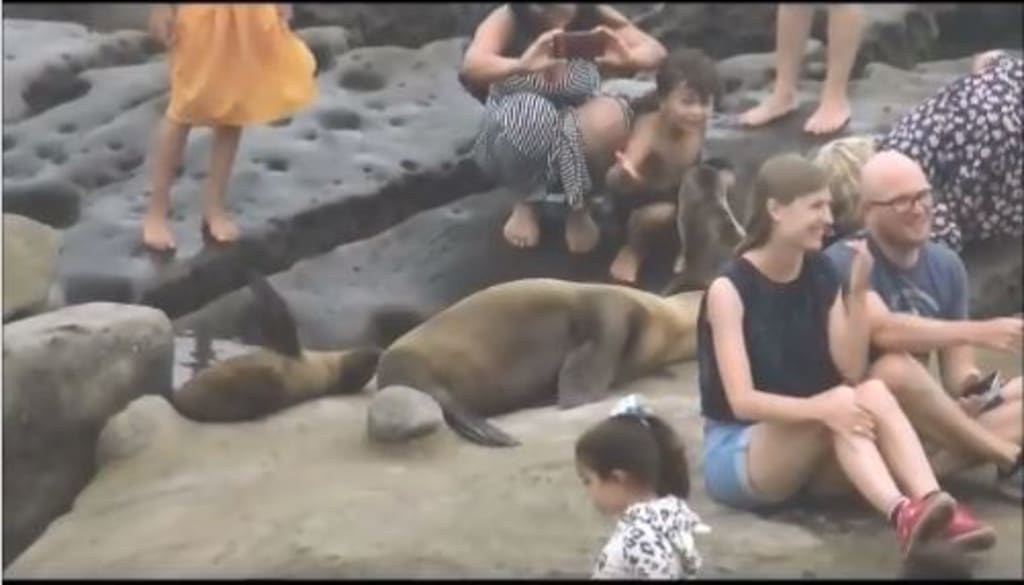Dear Parents, Don’t Let Your Kids Play With the Sea Lions on the Beach!
Touching, feeding, playing with, or even harassing sea lions and other marine mammals in US waters and beaches is a violation of the Marine Mammal Protection Act.

A California woman was recently visiting Point La Jolla Beach just right outside of San Diego, California when she saw a disturbing site: A group of families visiting the state harassing a colony of California sea lions. Andrea Else Hahn was visiting La Jolla’s famous sea lion rookery on Sunday when she witnessed a group of visiting tourists harassing a colony of sea lions by attempting to take selfies with them, feeding them, petting them, playing with them, and there was even a number of kids kicking sand at some juvenile sea lions. For three days, Hahn, continued to film the growing public ignorance and ongoing violation of the Marine Mammal Protection Act. This was despite a number of signs that were written in three different languages that advised the public to not attempt to feed, pet, nor harass the sea lions.
Established in 1972, the Marine Mammal Protection Act protects all marine mammals such as cetaceans, manatees, sea otters, polar bears, and pinnipeds within all marine habitats in the United States. As a result, it’s illegal to “take,” or collect marine mammals without a permit. In addition, it’s also illegal for people to harass, feed, hunt, capture, trap, collect, or kill any marine mammal. This includes the handling of marine mammal remains as well. This law also established response programs that are aimed at responding to marine mammal stranding and investigate unusual mortality events that have potential to result in extinction of wild marine mammal populations. It’s managed by the United States National Marine Fisheries Service as part of the National Oceanic Atmospheric Administration (NOAA).
What Hahn saw at the beach during that three-day period, which is very well known to serve as a rookery where seals and sea lions raise their pups, was truly a violation of the Marine Mammal Protection Act. In a video that Hahn later posted on Facebook, she confronted multiple tourists about their actions on the beach without much success as the tourists continued to harass the sea lions and take selfies with them. One man started to disrespect her after she caught him letting his toddler harass the animals on the beach. It just shows how some people can be very ignorant when it comes the law.
After all, a parent would not want their kid to go near a raccoon, nor an alligator, or any other wild animal. Yet, what makes sea lions any different? Look, I get that people tend to play on the idea that sea lions are docile animals, but they still transmits diseases to people and are very capable of biting them when they feel threatened by their presence. After all, since many of the people who were visiting the beach were involved in doing tours, it should have been the tour guide's responsibility to inform the tourists to stay at least 100 yards from the sea lions and not make any attempts to approach them in any shape or form. Then again, many of these people are very much likely have the mentality of “Why should I pay to feed or interact with sea lions at a zoo or aquarium when I can interact with them at the beach for free?” It just amazes me how some people just don't have respect for wildlife when they may attempts to harass them out in a wild setting. It's just disappointing on so many levels.
What most parents may not understand is that when people touch a sea lion pup out in the wild, it can prompt the mother to abandon her pup, increasing his chance of not surviving the first year of life. This is because sea lions, like all pinniped mothers, will not approach anything that has been in contact with people. This is because after a pup is born, the mother will return to sea for a brief period of time to go feed themselves in order to produce enough milk to provide nutrition that the pups need to grow and develop. Once the mothers return to shore, they will resume nursing them. However, if these pups were to get into contact with people just before the mother returns, chances are, they can never be reunited with their mothers thus, they end up getting abandoned by them, which can then, lead to death for these pups.
If these people really wanted to meet a seal or a lion up close in person, then they should have considered paying a visit to the SeaWorld park in San Diego to book themselves a Seal and Sea Lion Encounter. There, people can venture behind the scenes of a sea lion habitat at the park where they can meet one of the animal residents up-close by taking part in a fun, interactive training session with them that is educational on so many levels. In addition, the trainers do make the disclaimer to guests to not attempt this with animals out in the wild. So, maybe instead of trying to break federal law by harassing a wild sea lion, families visiting San Diego should consider booking a sea lion encounter at SeaWorld if they are considering letting their kids have that one-on-one experience with a sea lion in a safe setting that involves a trainer who has a relationship with the animal.
Remember, if you see someone attempt to harass a marine mammal out in the wild, please call your local wildlife officials right away to report the incident and a big thanks to Andrea for bringing this incident to light. Greetings from New Hampshire to you my friend.
Please share this video once it's watched. Thank you.
About the Creator
Jenna Deedy
Zoo and Aquarium Professional, Educator, Cosplayer, Writer and B.A. in Psychology whose got a lot to share when it comes to animals, zoos, aquariums, conservation, and more.
Instagram: @jennacostadeedy






Comments
There are no comments for this story
Be the first to respond and start the conversation.